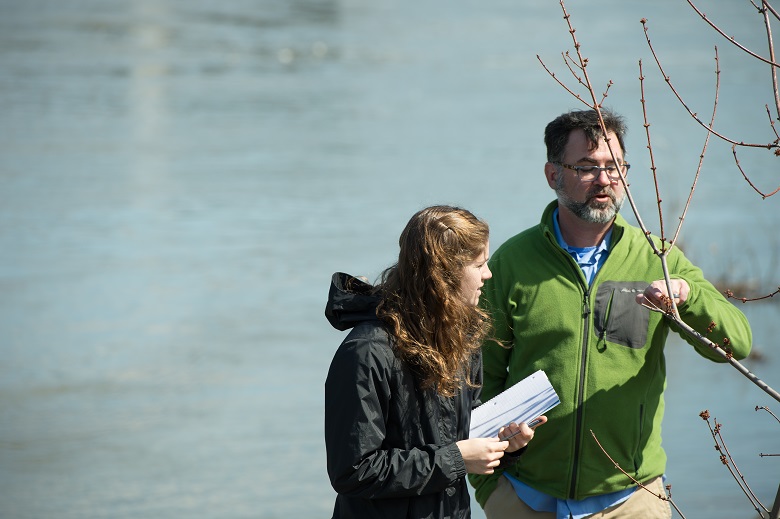Jeffrey Stratford, associate professor of biology, will get to do what he likes best on Saturday, May 4: sing the praises of birds. He will be a presenter at BirdFest, sponsored by the Pennsylvania Department of Conservation and Natural Resources. The event takes place at Nescopeck State Park from 10 a.m. to 3:30 p.m. and features various events and activities for children and families. It’s the perfect place for Wilkes’ resident ornithologist, the correct moniker for someone who specializes in studying birds, to share his passion. Stratford will lead two events that day: Mist-netting and Bird Banding and Bluebird Walk & Talk. News@Wilkes sat down with Stratford to find out more.
What can you expect from mist-netting and bird banding? “It’s like fishing,” Stratford explains. “Imagine saggy badminton nets. Birds hit the net and fall down. Then that allows me to pull the bird out unharmed,” he explains. “By having a bird in hand, you can get all sorts of information from the bird including age, health. That allows people to have close contact with a bird that they may not have had otherwise.” But like fishing, how many birds they’ll be able to interact with is just a matter of luck.
What happens during the Bluebird Walk and Talk? For this event, Stratford will tap into his post-doctoral days. “When I was at Auburn University, I had 200 bluebird boxes up around Georgia and did that for three years.” As the Bluebird coordinator for Luzerne County, Pennsylvania, Bluebird Society, Stratford will show attendees how to construct bluebird boxes, where to place them, how to monitor and take care of them, as well as deciding whether to clean them out at the end of the year, use predator guards and other helpful hints.
So why should we care about birds? “An unfortunate trend we are seeing is there are fewer experiences with nature,” he explains. “Anytime I can encourage a young person to get outside and to pay attention, all the better. We’re losing biodiversity, so if people don’t understand what that means, it’s a horrible thing.” Stratford explains that birds have more value than just to be watched. “Bird watching is a multibillion dollar industry. Birds do lots for us: eat insects, disperse seeds, pollinate flowers.”
Bird Watching Can Be Egg-Sighting. “I always watched birds. It stems from an aunt who bought me a bird guide. I was hooked from. I was 9 years old,” Stratford explains. “I didn’t realize there were other bird watchers.” Then, as an undergraduate at Rutgers, he was given the opportunity to catch birds. “Having handled a warbler. I told myself, ‘I have to do this,’ ” he says, adding, “It was a common yellowthroat. I still remember it to this day.”
How To Get Involved. Stratford explains that the best way to get started is to join a club. He suggests the Greater Wyoming Valley Audubon Society, which holds bird walks often.
Stratford also shared a few factoids about birds. But don’t Finch, or you’ll miss them.
4 Things You May Not Know About Birds
1.“Birds use birdhouses for nesting but then they hardly ever go back. They don’t use it as a house… Most birds that use birdhouses will winter in South America.”
2.“Migratory birds will fly across the Gulf of Mexico nonstop in a few hours. It’s the same as running three-quarter speed for 12 hours. Faster than a jog, but not a sprint for 12 hours.”
3.“You can touch bird eggs,” he explains. “I was always told don’t touch bird eggs because the parents will smell you and not come back… Birds actually have a great sense of smell but they just don’t care. What you don’t want to do (is handle the nest) because birds will abandon a nest if it’s disturbed too much.”
4.“You can’t get diseases from touching a bird,” he adds, “ If a bird has West Nile (virus), you would have to injure yourself, injure the bird and put the blood together.”






